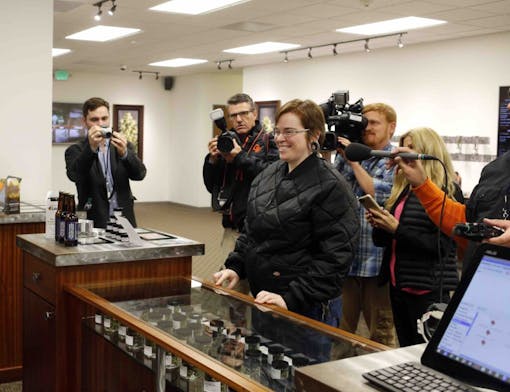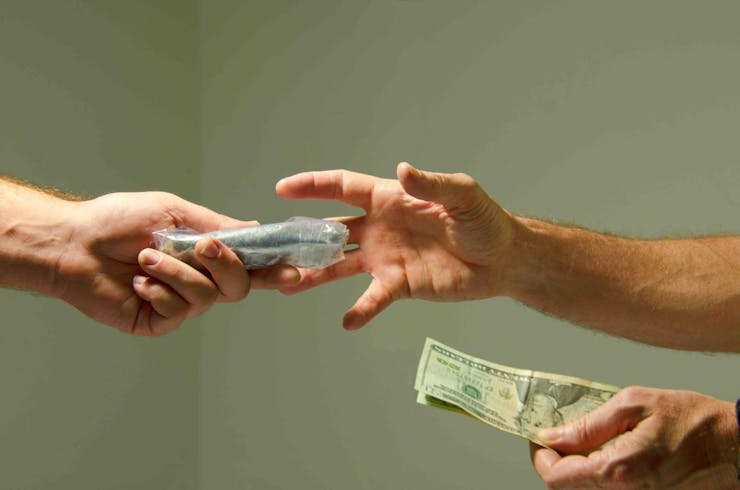It’s now legal for New Yorkers 21 and older to possess up to three ounces of cannabis, but it won’t be legal to sell marijuana until state licenses are issued, which is expected to happen in 2023.
That slow rollout of the legal retail market gives New York City’s unlicensed cannabis sellers one more year to figure out a plan. Will they transition to the legal market, or continue selling off the books?
Will NYC’s street sellers transition to the legal market, or continue off the books?
To hear what it’s like to navigate this new legal gray area, I recently spoke to three dealers with very different ambitions and strategies.
There’s Eddie, a Bushwick native who considers himself a pioneer of the old-school promotional method: handing out business cards and posting flyers in bodegas.
There’s Chris, a social media-savvy thirtysomething who’s used Tinder to promote his vegan edibles business.
And there’s Mark, a fiftysomething entrepreneur who began selling after seeing a relative use cannabis to detox from opiates.
To protect their legal status—because it’s still illegal to sell cannabis in New York State—all three men have been given pseudonyms.
Eddie: ‘It’s a thriving situation now’
“If your mindset is the giants are coming, the Wal Marts of marijuana are coming, I get it. It’s certainly possible. I get the fear, but I just don’t see it that way.”
Leafly: How long have you been in the marijuana business?
Eddie: I’d say about seven years.
Leafly: With the legalization of marijuana in New York you’re seeing more and more dealers and delivery services advertise openly on Instagram and social media. What were some of the earlier forms of promotion that you saw in your early days in the business?
Eddie: In the Bushwick area we were the first ones to start giving out cards. We had people reach out to us and thank us for giving them that idea. We’d go into bodegas and put up stickers and flyers and stuff like that.
We were almost like pioneers. People are way more relaxed about advertising now because its been accepted but back then people thought we were crazy for doing that because it was still illegal.

Leafly: In general how different was the business back then? How has it changed?
Eddie: There was more of a stigma. People thought we were crazy back then for trying to advertise. There was some real risk and danger to the whole thing, you know? It used to be the case that if the cops smelled weed that was probable cause and it was gonna be a problem. Now people are really open and free about it. Bodegas are literally selling weed—you can get flower from the corner store. So there’s a whole bunch of new smokers because the government says it’s legal now.
Leafly: How do you feel about legalization in New York? How do you think it will affect your business?
‘Legalization is a beautiful thing. There’s enough business for everybody.’
– Eddie
Eddie: It’s a beautiful thing. It will help someone like me get their foot in the door and think bigger and move forward. Some people may feel threatened, but I think there’s enough business for everybody.
It all depends on how you look at things. The black market always thrives. You will always be able to compete. The thing sells itself. I don’t need to sell the flower, that sells itself. But if your mindset is: The giants are coming, the Wal Marts of marijuana are coming, I get it. It’s certainly possible. I get the fear but I just don’t see it that way.
It’s a thriving situation right now. Now it’s not looked upon as a drug. People don’t look at you as crazy for smoking a joint. The stigma is gone.

Chris: ‘Even the legal market has risks’
“In the legal market in California they still have to transport money from dispensaries in armored cars and end up being robbed all the time. So even the legal market has its risks.”
Leafly: At what age did you get involved in the marijuana business?
Chris: At like 14 or 15. Doing different things. My own brand, Sweetfire, has been around about five years. I didn’t even really smoke but it was just around and a lot of my friends were involved with buying and selling. I was always looking for ways to make money and I just became more and more involved in it.
Leafly: What were the earliest methods of promotion? How did you get started using social media to promote the brand?
Chris: Back then you’d always see people with business cards because it was the cheapest thing. You could buy a thousand cards for $50.
But I’ve always been more interested in Instagram and social media as a means of getting the word out. I don’t really like the physical stuff. It’s a waste for the most part. And on Instagram you can communicate directly with your customers. I’ve even used Tinder for promotion at times.

Leafly: How did you use Tinder?
Chris: I’d just post photos of weed and cookies and people would match with us and then you’d talk to them and set something up. I realized that’s a lot of what people actually are doing on there.
Leafly: What angle did you take with your business that helped make you guys successful?
Chris: I have a different formulation for my oil that we use than the other stuff out there. Even if you go to a dispensary they’ve usually used butter and flour and isn’t really consistent. So once I figured out my fusion process, I had to figure out a vehicle.
‘The only people who won’t survive are the people who weren’t good at it to begin with.’
– Chris
People for the most part don’t want to just buy the oil; they don’t know what to do with it. I needed to figure out what kind of food to sell it in, rather than just selling the oil. I was making vegan cookies at the time, so I just combined the two things.
Ultimately people want something that’s quick and easy. They don’t really want to buy the oil and figure out what to do with it on their own. So I think we just offer something people want.
Leafly: What are your thoughts on legalization in New York? Do you think the black market will benefit from it?
Chris: I think it’s gonna be great for both markets. The black market needs some clarity and they need a stronger, more vetted market to back it up. We will have more access. There will be a level of competition that I think will be healthy.
So yeah, I think it’s a good thing. The only people who won’t survive are the people who weren’t good at it to begin with. Look at California. People out there don’t always buy from dispensaries, especially if they already have a product that they regularly use and enjoy. I have customers in California who I ship to because they like the product. They could easily go somewhere there, but they like it.
If the black market is there and it’s cheaper and has just as good if not better products, people will still do that. A big sentiment you hear is that people ultimately want a human touch to it, they don’t want to just be dealing with a corporation.

Leafly: So you’re not too concerned about moneyed interests flooding New York and eating into your businesses?
Chris: It’s definitely a possibility. But it also, again, comes down to quality control. A lot of people don’t have good quality. A lot of it is garbage. A lot of people out here could use the competition and the push to up their game.
‘I’m working on opening a legal brand. But I’ll be keeping the two businesses separate.’
– Chris
But the good sellers who have good independent relationships and strong customer bases and have something to offer will be fine. Yeah, there’s some people selling bad products. It wouldn’t be a bad thing for them to be weeded out. And it’s putting people’s health at risk. People getting sick from bad cartridges. Same thing with a lot of the weed vapes being sold at corner stores now. It’s gonna be difficult for some, but ultimately a good thing I think.
Leafly: Are you thinking about legitimizing your business?
Chris: I’m already working on opening a legal brand. But I’ll be keeping the two businesses completely separate. At first I think there will be a pretty open market for vegan edibles, which I specialize in. So I want to get in there right away.
Leafly: In New York possession is now legal but selling is still illegal. What’s it like to navigate this legal gray area?
Chris: It’s weird. But there’s always been changes. Now [financial regulators are] trying to record Venmo transactions, which everyone is really afraid of. That actually seems more threatening to the black market than the legal weed market—the financial regulations.
I’ve been doing this awhile and there’s always gonna be something. It comes down to being nimble and aware and being willing to change. There are risks in any business. In the legal market in California, they still have to transport money from dispensaries in armored cars and end up being robbed all the time. So even the legal market has its risks.
Leafly: How has legalization affected your business?
Chris: It’s hard to tell because [legalization happened at the same time as the emergence] of coronavirus. There was a boost for everybody at the beginning of the pandemic, with people getting unemployment and stimulus checks. So business was actually good for a while. Now things are getting a bit more tight because of the end of unemployment.
The main difference from what I can tell is just that people are more comfortable and open and relaxed about weed than they were even just a few years ago.
Leafly: Now that it’s legal, are you pushing the social media advertising more?
Chris: Definitely. Before, if you put weed in a photo, Instagram would flag you or try to block your account. Now they aren’t doing that, but you get less exposure with less interactions. So you have to work twice as hard. There are still challenges.
Leafly: How long do you see yourself staying in this business?
Chris: I don’t plan to stop. I love doing it and I’m looking forward to getting in the legal market. I’m even thinking about other cities. I’ve thought about Europe even. I don’t plan on stopping.

Mark: East Coast growers opened up supply
“They don’t owe me anything more than Budweiser owed bootleggers back in the 1930s, you know?”
Leafly: How did you get started in the business?
Mark: Weird story. I got weed for a family member who was detoxing from opiates. She was addicted to Oxycontin. All the traditional methods of kicking the drugs didn’t help. So back in 2011 we started giving her high grade marijuana to help deal with the withdrawals. I’m over 50. I didn’t really start smoking till I saw what it was doing for her. Then my dealer said if I had any friends who smoke that I could deal to them. I was working at an office and just started dealing to my friends at the office. That’s how it all started.
Leafly: What was your job at the time?.
Mark: I worked at a bank downtown.
Leafly: Wow, that’s a big a career change.
Mark: (laughs) It definitely was a big change.
Leafly: How has the business changed since you first started out?
Mark: I’ve done everything, including getting stuff in Colorado and California and [transporting it] here. The logistics of getting it here—even back in 2017, 2018—were really difficult. People would drive with hundreds of pounds and they’d charge us like $200 to $300 for a pound for the risk.
‘I might go to a dispensary for wax or cartridges. But for flower I’d rather deal with a real person.’
– Mark
The risk now is lower—though if you drive from Colorado you still have to deal with Nebraska and different states where they will hit you with significant jail time if caught. Now with legalization on the East Coast you don’t have to go that far. You can get it from states up north like Massachusetts. And in New York now you will be able to grow as well, once the laws are all in place. So it’s changed big-time in terms of availability.
Leafly: How do people in the business feel about legalization?
Mark: I think there’s two different sets of people. There’s people who want to invest in legal things, and by that I mean making shatter and distillates and edibles. And there’s people who just sell like I do and don’t really care and are just worried about selling their next QP.
For the most part I think people on the street don’t care. The legal market isn’t fully in place here yet, so there isn’t really any way of going to a dispensary. Even in Jersey, there’s only four or five dispensaries in the whole state.
For people who have money to invest, they’re trying to get in early on the legal market. So there’s that separation between the people who have money and want to invest and see opportunities, and then street level dealers. Myself, I think legalization is good and I don’t think people should be arrested or face jail time for it, so that’s great.

Leafly: When retail stores open in New York, will that drastically affect your business?
Mark: If you look at Michigan, where it’s legal and there are so many dispensaries, there’s still a significant black market. When I go there I don’t go to dispensaries.
Now, I might go to a dispensary for wax or for cartridges. That’s because I don’t trust the sources for them on the street level. There’s a lot of counterfeit stuff that can be harmful. But for flower I’d rather deal with a person. And it’s likely going to be cheaper than a dispensary.
Leafly: What’s it like dealing right now when it’s legal to possess but not to sell?
Mark: I’ve been pulled over by cops in plain clothes. Even before it was legal, cops didn’t really care about weed. The cops found two ounces in my car and just gave it back to me. And now especially, they don’t care. Unless you have fifty, sixty pounds, I don’t think they care at all. I don’t worry about it too much.
Leafly: Do you have any ambitions to enter the legal market?
Mark: I know people who want to be a cultivator or get a dispensary license. But I’m not interested, personally. Like I said, I’m happy with where I’m at.
Leafly: Is there any risk of deep-pocketed marijuana companies taking business away from independent dealers?
Mark: I’m not worried about it. No one owns any rights to weed. It grows in the ground. If a business comes in, they have the right. They don’t owe me anything more than Budweiser owed bootleggers back in the 1930s, you know? Times change and it just is what it is.





